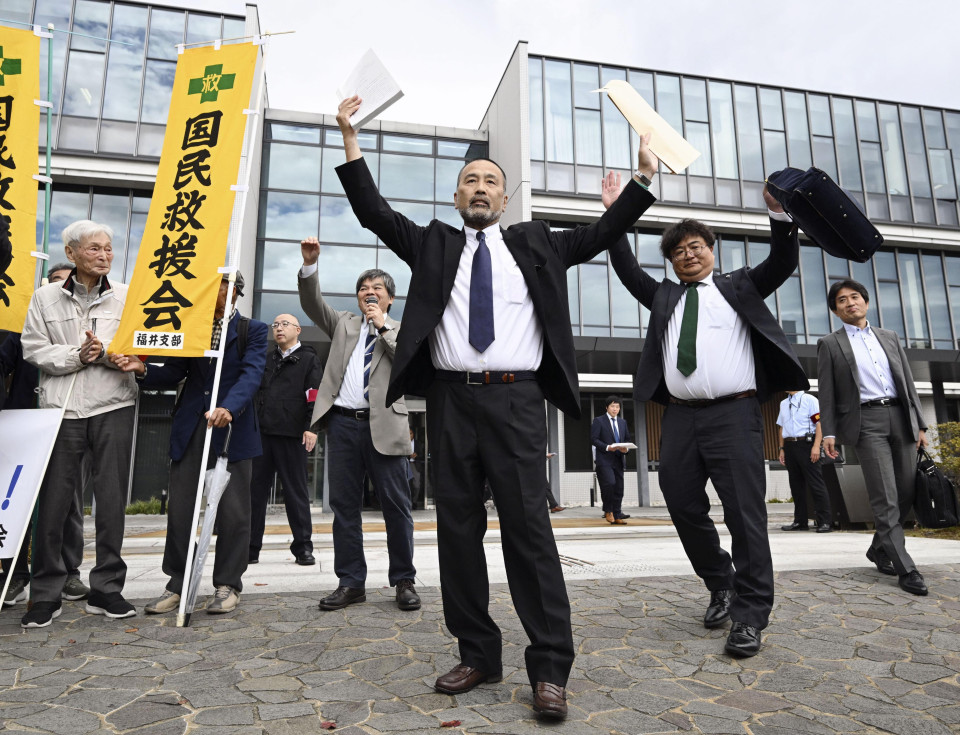Japan has taken a major step toward revising the country’s retrial system, which has been criticized as making the process of overturning a wrongful conviction excessively lengthy.
But the prospects of swift reform are unclear, with fierce opposition from within the Justice Ministry to one of the key proposed changes — restricting objections from prosecutors against court decisions ordering retrials.
On March 28, the Legislative Council, a ministry advisory body, was asked by Justice Minister Keisuke Suzuki to look into the issue.
“The public’s interest (in the issue) is extremely high. I expect to receive recommendations as early as possible,” Suzuki told a press conference earlier in the day.
The move followed the highly publicized acquittal last year of 89-year-old Iwao Hakamata, who had spent nearly half a century on death row following a quadruple murder conviction.
“It’s not just a matter of saving Iwao,” said his sister Hideko Hakamata, 92, as she attended a gathering in the Diet several days earlier to seek the revision of a system that has been left untouched since the criminal procedure law was established in 1948.
It took 42 years after first applying for a retrial to reopen her brother’s high-profile 1966 murder case.
In the decades-long struggle for justice by the former boxer and his family, they faced what seemed an insuperable hurdle in prosecutors’ reluctance to disclose evidence and their objections to reopening the case.

Hideo Yamada, chief of the Shizuoka District Public Prosecutors Office, bows in apology to Iwao Hakamata (2nd from R) and his sister Hideko (far R) during a visit to their home in Hamamatsu in Shizuoka Prefecture, central Japan, on Nov. 27, 2024. Iwao Hakamata was acquitted in a retrial in September over a 1966 quadruple murder case, after spending more than four decades on death row. (Kyodo)
The criminal procedure law stipulates that a retrial will be opened if there is “clear evidence to find the accused not guilty.” But it lacks provisions on the disclosure of evidence held by prosecutors, hindering efforts to overturn convictions, experts say.
Iwao Hakamata is not the only one who had to wait for decades until new evidence opened the door for a retrial.
Shoshi Maekawa, 59, filed a request for a retrial in 2004 after serving a seven-year sentence for the 1986 murder of a junior high school girl in central Japan.
The Nagoya High Court’s Kanazawa branch decided in 2011 to reopen the case, but the decision was overturned by the Nagoya High Court following an objection from prosecutors.
After filing a second request for a retrial in 2022, the Kanazawa court ordered a retrial as 287 new pieces of evidence disclosed by prosecutors undermined the credibility of the testimonies from Maekawa’s acquaintances that led to his conviction.
He is almost certain to be acquitted after his retrial was held in March.

Shoshi Maekawa (front), who served a seven-year prison sentence over the 1986 murder of a junior high school girl in Fukui Prefecture, reacts in Kanazawa, Ishikawa Prefecture, on Oct. 23, 2024, after the Kanazawa branch of the Nagoya High Court ordered a retrial. (Kyodo) ==Kyodo
The Japan Federation of Bar Associations has criticized the current system for allowing prosecutors to file objections against court decisions to reopen a case, which often result in the rulings being overturned.
“It has been a major factor delaying relief for the victims facing false accusations,” said the group, which has been supporting many seeking retrials.
That issue, along with rules on evidence disclosure for deciding on retrials, are the main topics of the council’s discussions.
“It is true that there are problems. The ministry will lose trust if we do nothing,” said a senior ministry official.
But some legal and prosecution officials are strongly against restricting prosecutors from appealing. Another senior ministry official, for instance, cited a 1979 murder case in which a 97-year-old woman was convicted.
Ayako Haraguchi served 10 years in prison for killing her brother-in-law in Kagoshima Prefecture in 1979. In her third request for a retrial, the Supreme Court decided against reopening the case although district and high courts had ruled in her favor.
“Even courts have diverging views. We should still leave room for three rounds of deliberations,” the official said.
Under the usual process of legal revisions, the council would recommend the outline for revisions following discussions. The ministry would then prepare a bill and submit it to parliament for deliberation.
The process only requires a month if the path toward revisions is clear from the beginning, but it is likely to take more than one year if there are many points of disagreements, with one official expecting discussions to take at least a year.
Meanwhile, a group of over 370 cross-party lawmakers is working with the Japan Federation of Bar Associations to amend the system through legislation drafted by Diet members during the current session.
Masahiko Shibayama, the leader of the lawmakers’ group, said revisions needing urgent responses can be made through lawmaker-drafted legislation with remaining issues left for examination by the ministry panel.
Its outline of a bill to revise the criminal procedure law includes obliging courts to order prosecutors to disclose evidence if requested by lawyers acting for those seeking retrials as well as banning objections from prosecutors against reopening cases.
“Parliament is the highest organ of state power. It is clear that our process should be prioritized (over the ministry’s move) under the Constitution,” Shibayama said.
Related coverage:
Man acquitted of 1966 murders awarded record criminal compensation
Man in 1986 Japan murder case set to be acquitted as hearing ends
Over 80% support death penalty in Japan: gov’t survey

AloJapan.com